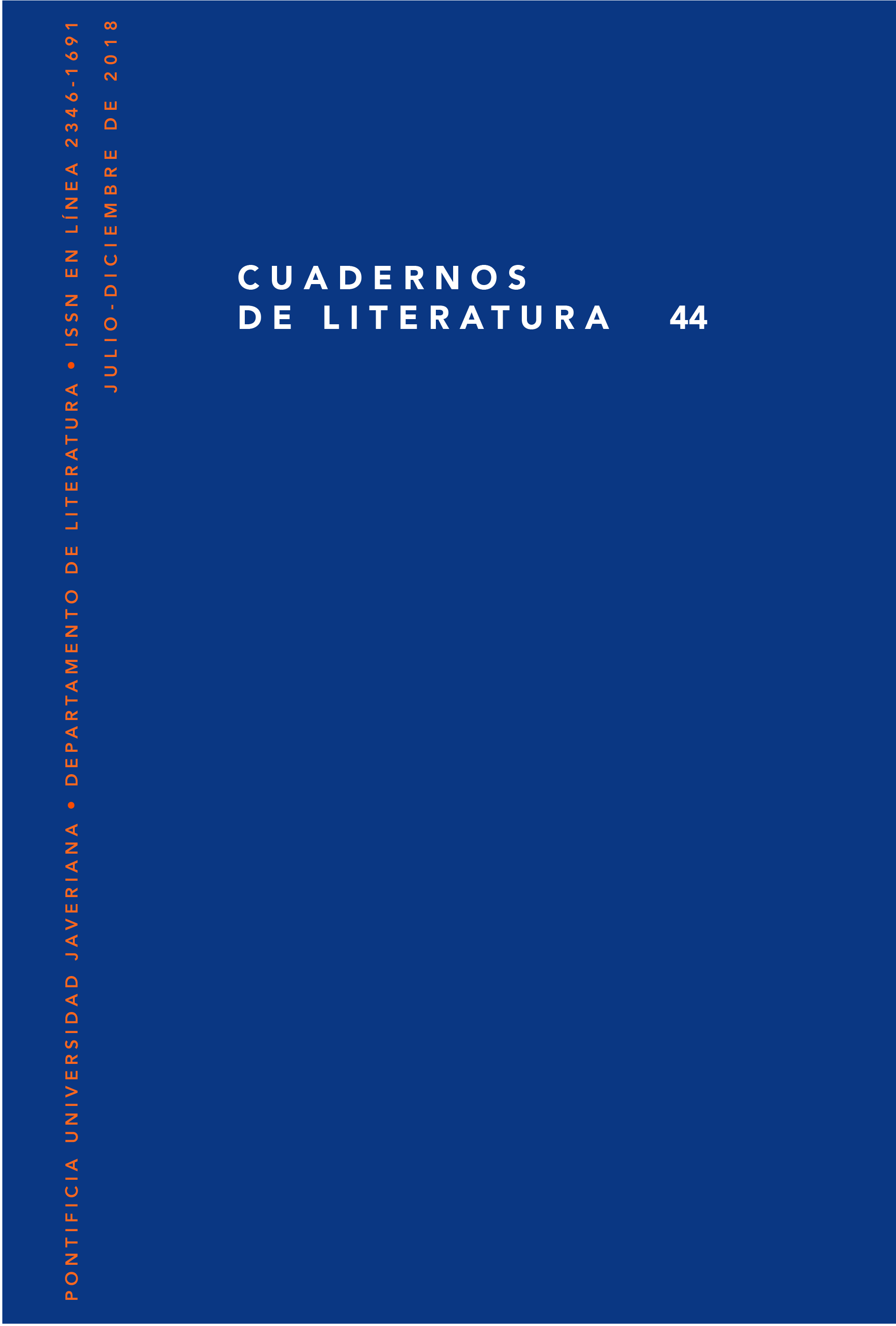Abstract
In recent years, it has been possible to detect in Argentine literature, that a documentary turn has come to complete, and not to replace, the subjective turn to which a decade ago Beatriz Sarlo and others referred to. Some aspects of this “turn” in Argentine cinema, appeared earlier in relation to what Hal Foster called “the return of the real”. This work seeks to reflect on the transformations that, in this sense, take place in both literature and contemporary cinema, based on the analysis of a series of books and films produced by the children of the people who disappeared during the last military dictatorship.
Aguilar, Gonzalo. Otros mundos. Un ensayo sobre el nuevo cine argentino. Buenos Aires: Santiago Arcos, 2010. Impreso.
Alcoba, Laura. La casa de los conejos. Buenos Aires: Edhasa, 2008. Impreso.
Amado, Ana. La imagen justa. Buenos Aires: Colihue, 2009. Impreso.
Andermann, Jens y Álvaro Fernández Bravo. La escena y la pantalla. Cine contemporáneo y el retorno de lo real. Buenos Aires: Colihue, 2013. Impreso.
Blanchot, Maurice y Jacques Derrida. The instant of my death/Demeure, fiction and testimony. Stanford: Stanford University Press, 2000. Impreso.
Borges, Jorge Luis. “La muralla y los libros”. La nación (22 de octubre de 1950). http://www.lanacion.com.ar/814407-la-muralla-y-los-libros. Web.
Bruzzone, Félix. 76. Buenos Aires: Tamarisco, 2008. Impreso.
Bruzzone, Félix. Los topos. Buenos Aires: Mondadori, 2008. Impreso.
Carri, Albertina y María Moreno. “Esa rubia debilidad”. Radar (19 de octubre de 2003). https://www.pagina12.com.ar/diario/suplementos/radar/9-1001-2003-10-22.html. Web.
Contreras, Sandra, comp. Realismos. Cuestiones críticas. Cuadernos del seminario II. Rosario: UNR, 2013. Impreso.
Freud, Sigmund. Lo siniestro. Buenos Aires: Ediciones Noé, 1973. Impreso.
Gamerro, Carlos. “Tierra de la memoria”. Radar (11 de abril de 2010). http://www. pagina12.com.ar/diario/suplementos/libros/10-3787-2010-04-11.html. Web.
Gelman, Juan y Mara la Madrid. Ni el flaco perdón de dios. Buenos Aires: Planeta, 2017. Impreso.
Giorgi, Gabriel. Formas comunes. Buenos Aires: Eterna Cadencia, 2014. Impreso.
Kamenszain, Tamara. Una intimidad inofensiva. Los que escriben con lo que hay. Buenos Aires: Eterna Cadencia, 2016. Impreso.
Kohan, Martín. “La apariencia celebrada”. Punto de vista 78 (Buenos Aires, abril de 2004): 24-30. Impreso.
Pauls, Alan. “Malvinas’ 78”. Radar (1 de junio de 2008). http://www.pagina12.com. ar/diario/suplementos/radar/subnotas/4639-754-2008-06-02.html. Web.
Pérez, Mariana Eva. Diario de una princesa montonera. Buenos Aires: Capital Intelectual, 2012. Impreso.
Piglia, Ricardo. “Tres propuestas para el próximo milenio”. Radar (23 de diciembre de 2001). http://www.pagina12.com.ar/2001/ suple/Radar/01-12/01-12-23/NOTA2.HTM. Web.
Sarlo, Beatriz. Tiempo pasado. Buenos Aires: Siglo XXI, 2005. Impreso.
Sarlo, Beatriz. “Sujetos y tecnologías. La novela después de la historia”. Punto de vista 86 (Buenos Aires, diciembre de 2006): 1-6. Impreso.
Stewart, Susan. On longing. Londres: Duke University Press, 1993. Impreso.
Cuadernos de Literatura is registered under a Creative Commons Attribution 4.0 International Public License. Thus, this work may be reproduced, distributed, and publicly shared in digital format, as long as the names of the authors and Pontificia Universidad Javeriana are acknowledged. Others are allowed to quote, adapt, transform, auto-archive, republish, and create based on this material, for any purpose (even commercial ones), provided the authorship is duly acknowledged, a link to the original work is provided, and it is specified if changes have been made. Pontificia Universidad Javeriana does not hold the rights of published works and the authors are solely responsible for the contents of their works; they keep the moral, intellectual, privacy, and publicity rights.
Approving the intervention of the work (review, copy-editing, translation, layout) and the following outreach, are granted through an use license and not through an assignment of rights. This means the journal and Pontificia Universidad Javeriana cannot be held responsible for any ethical malpractice by the authors. As a consequence of the protection granted by the use license, the journal is not required to publish recantations or modify information already published, unless the errata stems from the editorial management process. Publishing contents in this journal does not generate royalties for contributors.


